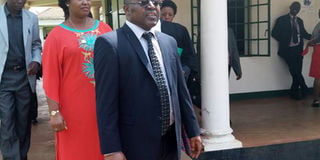Will government’s billions transform Kasese?

Omusinga wa Rwenzururu, Charles Wesley Mumbere and his wife at Jinja Court recently. FILE PHOTO
What you need to know:
- With the Saleh-led initiative, Kasese and the Bakonzo have a chance to gather the pieces and build for the future.
Kasese District is yet to recover from the tragedy that befell the land in 2016 when more than 100 people lost their lives at the Rwenzururu Palace. As part of efforts to help the people heal, government has earmarked a multibillion shilling Agro-Industrialisation Local Economic Development (AgriLED) initiative for the Rwenzori sub-region. The initiative aims at transforming local governments to eradicate poverty and ensure sustainable wealth creation by paying attention to the needs of the districts. It also seeks to enhance private sector growth through enterprise development and attracting local and foreign investors.
The initiative is also expected to widen the revenue base for local governments, strengthen capacities in terms of infrastructure and human resource, leverage the existing expertise and technology to develop agro-industries and promote cross border trade. It was crafted under the guidance of Gen Salim Saleh, the chief coordinator Operation Wealth Creation (OWC) for the benefit of Kasese, Bundibugyo, Bunyangabu, Ntoroko, Kabarole, Kyenjojo and Kyegegwa districts. They will collectively receive Shs649b to implement their plans over three years, with Kasese District taking Shs119b of the sum.
This move has drawn mixed reactions from area residents. Although many leaders have welcomed the initiative, it appears to be a litmus test of sorts for the locals. Who will grab the opportunity that government presents? Will Kasese/Bakonzo listen and answer government’s call to turn the mineral-rich district’s fortunes?
Gen Saleh’s plan is a recognition by government that the central government’s long-standing feuding with the locals is partly caused by poverty, hence addressing the problem will go a long way in spurring development in Kasese and the wider Rwenzori sub-region.
For long, many people in the region have been suspicious that the subsequent governments since 1962, have been working against their wishes. This explains why Omusinga Isaya Mukirania mooted the idea of creating a separate Yiira state, where he believed the Bakonzo needs would be met. However, this was shelved when in 1982, his son and current Omusinga wa Rwenzururu, Charles Wesley Mumbere accepted the olive branch offered by then president Milton Obote and descended from the hills of Rwenzori where he had taken on his father’s mantle of fighting for recognition of the Bakonzo. Recognition is something the Bakonzo have been struggling for.
Some Bakonzo suffer from a form of inferiority complex weaved with ignorance with all associated problems such as unemployment and poverty. There is a belief among them that government does not care about their wellbeing. Such sentiments are partly born from the fact that governments have towed with the issue of Rwenzururu Kingdom and recognition of the ethnic group, which is also fed by ignorance.
However, with the Saleh-led initiative, Kasese and the Bakonzo have a chance to gather the pieces and build for the future. It will take long to heal from what happened, especially those who were directly affected, but using available opportunities and resources will go a long way in the healing process. Kasese’s natural resource wealth is well documented. Using this opportunity to transform the district’s mainly subsistence farming into large scale commercial agriculture will be the proverbial magic bullet needed to curb ignorance, unemployment and poverty that have plagued the area for long.
Alex Joel Masereka,
[email protected]




